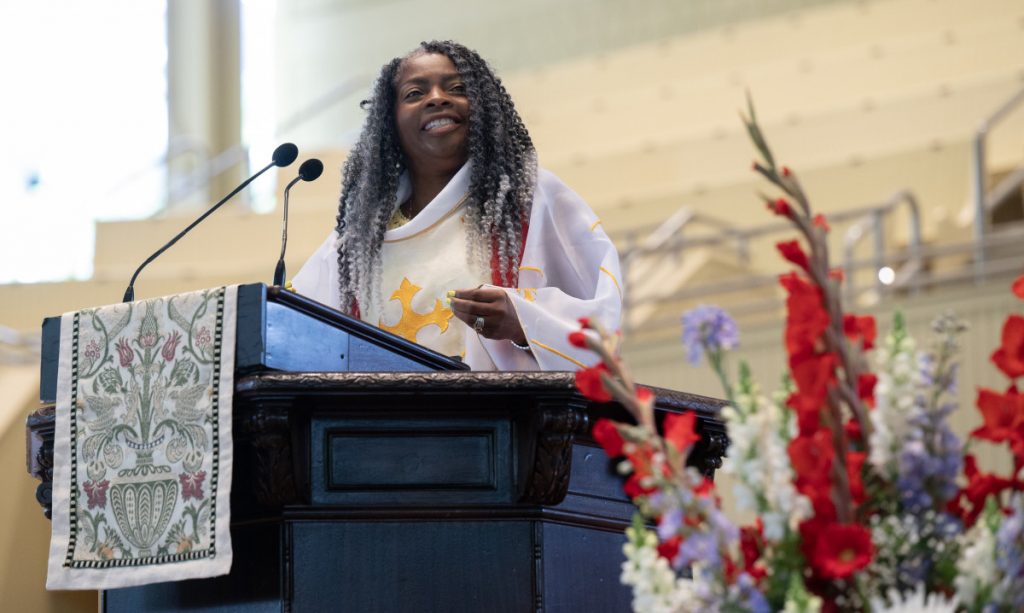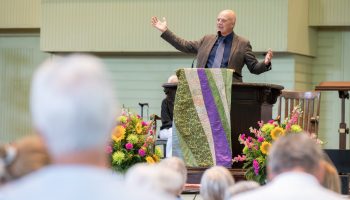
Bishop Cynthia Moore-Koikoi delivers her sermon “The Declaration of Independence: We are Free from Grandma’s Context” during the morning worship service.
Bishop Cynthia Moore-Koikoi warned the congregation that her sermon would be a challenge “if you believe in the inerrancy of scripture rather than the inspired word of God. But I ask you to consider a different perspective.” She continued: “You will decide what is the meat and what are the bones. You can eat the meat and throw away the bones, or to be inclusive, you can eat the fruit and spit out the seed.”
Moore-Koikoi preached at the 9:15 a.m. Tuesday morning service of worship in the Amphitheater. Her sermon title was “Declaration of Independence: We are Free from Other People’s Stuff,” and the scripture reading was Galatians 3:23-29.
“I believe you can hold the text as sacred and still be critical,” she said. “I believe in the sacredness of the text and believe that people of faith must be critical. If the text can’t stand criticism, then it is not sacred.”
Moore-Koikoi disagreed with Paul, the writer of the letter to the Galatians, that in Christ “there is no longer Jew or Gentile … slave or free … male and female, for you are all one in Christ Jesus.”
“I believe (this passage) reflects that Paul is still in bondage to other people’s stuff, particularly people that are uncomfortable with diversity,” she said.
Her critique of Paul may appear to be looking at the text literally, rather than using an idiom or analogy; but idioms, she said, can do harm in a diverse community. “They can imply that I have to give up part of my identity in order for there to be unity in Christ.”
“I own my African DNA and I don’t have to reject it to be part of the church,” she continued. “I am a woman, but I don’t have to give up my gender in order to serve as a bishop. We cannot have true unity unless we can come with our whole self.”
It can be a challenge to show up with your whole self, she told the congregation. To minimize or ignore diversity, to insist that if you do not assimilate, you cannot be part of the community, discounts the full humanity of another person.
“When we see differences,” she said, “we discover what we don’t like and we get uncomfortable.” Nicholas Carr, in his Monday Interfaith Lecture, called this the “dissimilarity cascade.”
She continued: “This means that the more you know about the person, the less you like them. The more you find out, the more you find out how dissimilar to the other person you are, and the less you like them.”
It may be alright to not like some in the world, she said, “but in the church we are supposed to like everyone. The superficial relationships in the church preserve the unrealistic expectation that we will like everyone. This is not in scripture — ‘love,’ yes; ‘like,’ no.”
Paul was not likable, Moore-Koikoi asserted, and Peter was not someone to invite to a party. “The key to our independence is to acknowledge the lack of likeability,” she said.
God, she said, chose to make us in God’s own image, knowing this would make us uncomfortable. “There are 8 billion of us on this planet,” she said. “We are not alike but we are God’s image bearers. We should relish our diversity and discomfort to help us see more fully.”
She told the congregation that “if we desire to know God, we have to move from tolerating diversity, to embracing diversity, to relishing diversity. The only way to fully know God is through God’s image that is more fully reflected in all God’s creation.”
God wants us to bring our whole selves to the party, she said. The world will miss out seeing a part of God if we don’t.
“I need you to be fully who you are so that I have a hope of experiencing God when we are together,” Moore-Koikoi said.
When she was a district superintendent in Washington, D.C., Moore-Koikoi worked with a congregation that was changing, bringing in Methodist immigrants from the Caribbean and Africa. The minister of music decided to introduce music that was not in the United Methodist hymnal.
One day “a saint of the church stopped the music minister in the parking lot,” she said. “The saint said that he did not like to sing songs he had never heard before because they made him uncomfortable.”
She continued, “The wise young minister asked if the saint had enjoyed the hymns they had sung that morning. The saint said yes, he did. The minister said, ‘The immigrant population are not accustomed to them but they sang them anyway. That is what we do in community, we sing each other’s songs even when they make us uncomfortable.’ ”
Moore-Koikoi said, “Relish that.”
The Rev. John Morgan, pastor of the Williamsburg, Virginia, Presbyterian Church, presided. Annie Leech, a student at Pittsburgh Theological Seminary and the student minister in the Department of Religion for the 2024 season, read the scriptures. The prelude was “Folk Tune,” by Percy Whitlock, played by Joshua Stafford, director of sacred music and the Jared Jacobsen Chair for the Organist, on the Massey Memorial Organ. The Motet Choir sang “The Call of Wisdom,” with music by Will Todd and words by Michael Hampel, based on Proverbs 8. Stafford directed the choir and Owen Reyda, organ scholar for the 2024 season, accompanied them on the Massey Organ. The postlude was “Pæan,” by Percy Whitlock. Support for this week’s preaching and chaplaincy is provided by the Geraldine M. and Frank E. McElree, Jr. Chaplaincy Fund.




